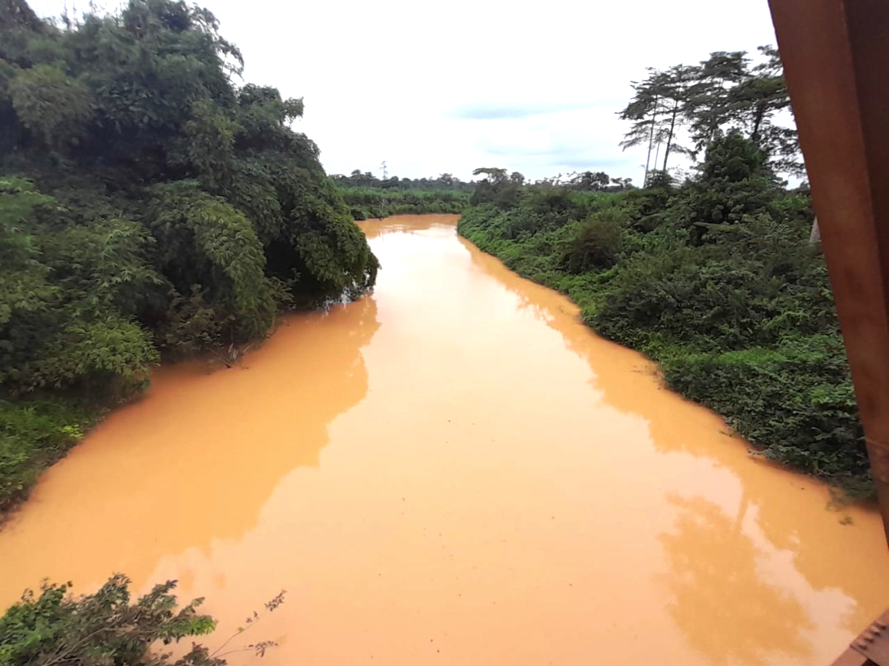
Effect of galamsey: Eastern Region GWCL reeling from high treatment cost
The pollution of water bodies in the Eastern Region due to the activities of illegal miners has adversely affected water quality in the area.
The situation has compelled the Ghana Water Company Limited (GWCL) to use more chemicals for the treatment of water to make it wholesome for human consumption.
One of the heavily polluted water bodies is the Birim River.
The region depends on water mainly from the Densu River, the Volta River and now heavily polluted Birim River.
The Eastern Regional Chief Manager of the GWCL, Asomani Kweku Nyarko, in an interview with the Daily Graphic at his Koforidua office last Tuesday said since the company had to use more chemicals such as chlorine and alum, among
others, which was making them incur huge losses.
He said before the illegal mining (galamsey) menace, the company was using 19 milligrammes of chemicals per litre of water but currently it was using 103 milligrammes of chemicals per litre of water.
PURC tariffs
In view of the situation, Mr Nyarko indicated that the company had not been able to charge the Public Utility Regulatory Commission agreed tariffs due to shutdowns of its treatment plants as a result of pollution of the water by ‘galamsayers’.
Apart from that, he stated that the frequent destruction of the pipelines by construction firms made it impossible for the company to regularly supply water to consumers.
Consumers, he indicated, were therefore, unwilling to pay bills because they were not getting the water as required and that had affected the company's finances.
That, he said, was because the company could only produce 50 cubic metres of water instead of the required 95 cubic metres of water for consumers out of the required 100 cubic metres.
He stated that the company's inability to produce more for human consumption was bringing dissatisfaction to consumers because GWCL could simply not meet their demand.
Mr Nyarko also pointed out that a lot of water was being thrown away as waste (bi-product) due to the level of pollution.
Equipment replacement
He said the unfortunate situation was that the bad nature of the raw water had compelled the company to be replacing its water treatment equipment every five years instead of 15 years.
The Eastern Regional GWCL boss noted that such replacements had also been making the company incur financial losses.
With regard to the water situation in the New Juaben South and New Juaben North municipalities as well as some parts of the Abuakwa North Municipality, Mr Nyarko said those areas relied on water from the Volta and the Densu rivers through treatment plants at Bukonor (Volta River) and Koforidua (Densu River).
Akim Oda, Nkawkaw, Nsawam
At Akim Oda, he said the town’s water treatment plant, which had not been functioning properly due to the recent torrential rainfall, had been repaired and now water was flowing from the town to Akwatia, Kade and adjoining communities. He added that Akim Swedru and its surrounding villages would soon get their share of treated water.
He also explained that the Akim Oda Water Treatment Plant was under utilised because demand for water was less than the capacity, while the supply lines in the Krobo enclave were being improved.
Speaking to the situation at Nkawkaw and on the entire Kwahu Ridge, Mr Nyarko indicated that while consumers at Nkawkaw relied on water from boreholes which were being improved, those on the Kwahu Ridge depended on water drawn from the Afram River and treated at the Kotoso Water Treatment Plant.
Within Nsawam and its environs, he stated that the area had a peculiar water supply situation because it was heavily built, as a result of which the company had to embark on demand management.
Mr Nyarko explained that in view of that Nsawam had to be provided with water for four days within the week, while the environs got water for three days within a week.
Consumers speak out
In an interview with the Daily Graphic, Bernice Ofori from Klow Town, a suburb of Koforidua, said she was not happy about the irregular flow of water to her rented premises, adding that while GWCL periodically shut down the taps, her landlord also did that on specific days such as Wednesdays, Saturdays and Sundays.
According to her, the landlord's action was to prevent water wastage by children in the house and that had been causing a lot of inconvenience to the household.
Isaac Mensah, a resident of Kukurantumi in the Abuakwa North Municipality, also told the Daily Graphic that the flow of water to the community had not been frequent and that had been adversely affecting both domestic and commercial activities.
Writer's email:
